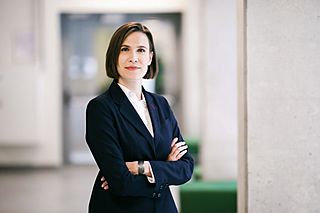Urtė Neniškytė facts for kids
Quick facts for kids
Urtė Neniškytė
|
|
|---|---|
 |
|
| Born | 2 November 1983 |
| Citizenship | Lithuanian |
| Alma mater | University of Cambridge, Vilnius University |
| Awards | L'Oréal-UNESCO Baltic For Women in Science fellowship 2017 L'Oréal-UNESCO For Women in Science International Rising Talents 2019 |
| Scientific career | |
| Fields | neuroscience, biochemistry |
| Thesis | Amyloid β and microglial phagocytosis (2012) |
Urtė Neniškytė (born 2 November 1983) is a scientist from Lithuania who studies the brain. She is known as a neuroscientist. Her main work focuses on how different brain cells, like neurons (nerve cells) and immune cells, interact with each other.
She has researched Alzheimer's disease, a condition that affects the brain. She also helped write some of the first scientific papers about how cells die and how other cells "eat" them. This process is called phagocytosis.
Education and Early Research
Urtė Neniškytė studied biochemistry at Vilnius University in Lithuania. She earned her first degree in 2006. During her studies, she worked as an intern at a large science lab in Germany. Her first research project looked at how certain proteins move inside cells.
She continued her studies at Vilnius University and earned her master's degree in biochemistry in 2008. For her master's project, she worked on using tiny molecules called microRNAs for studying cells with a special microscope.
In 2012, she completed her PhD in biochemistry at the University of Cambridge in the United Kingdom. Her PhD research focused on Alzheimer's disease. She studied how certain brain cells, called microglia, might "eat" other brain cells. This process could lead to the loss of neurons in Alzheimer's disease. She found that microglia cells play a role in this neuron loss.
Her Scientific Career
After finishing her PhD, Urtė Neniškytė worked as a researcher at the University of Cambridge. She helped with a project about genes that might increase the risk of getting Alzheimer's disease later in life. This research also looked at how these genes affect microglia cells.
Later, she worked as a scientific consultant in Lithuania. She helped develop new ways to study diseases by looking at tissues under a microscope.
From 2013 to 2016, Urtė Neniškytė was a trainee at the European Molecular Biology Laboratory. She studied how the brain "prunes" or removes unnecessary connections between neurons during development. This process helps the brain become more efficient.
Currently, Urtė Neniškytė is a researcher at Vilnius University. Her team is trying to understand the exact steps that tell brain immune cells to remove extra connections between neurons. This "pruning" is important for a healthy and well-developed brain network.
Since 2006, she has been a member of several important scientific groups. These include the Lithuanian Biochemical Society and the Lithuanian Neuroscience Association. She is also a board member of the Research Council of Lithuania.
Awards and Achievements
Urtė Neniškytė has received several awards for her scientific work.
- In 2017, she was given the L'Oréal-UNESCO Baltic For Women in Science fellowship. She was the first scientist from Lithuania to receive this award.
- In 2019, she was one of 15 scientists from around the world to receive the L'Oréal-UNESCO For Women in Science International Rising Talents award.
Other awards she has received include:
- International Brain Research Organization Return Home Fellowship (2017): This helped her set up her research group at Vilnius University.
- Marie Skłodowska-Curie Individual Fellowship (2016): This supported her project at Vilnius University.
- Marie Skłodowska-Curie Intra-European Fellowship (2012): This supported her project at the European Molecular Biology Laboratory.

